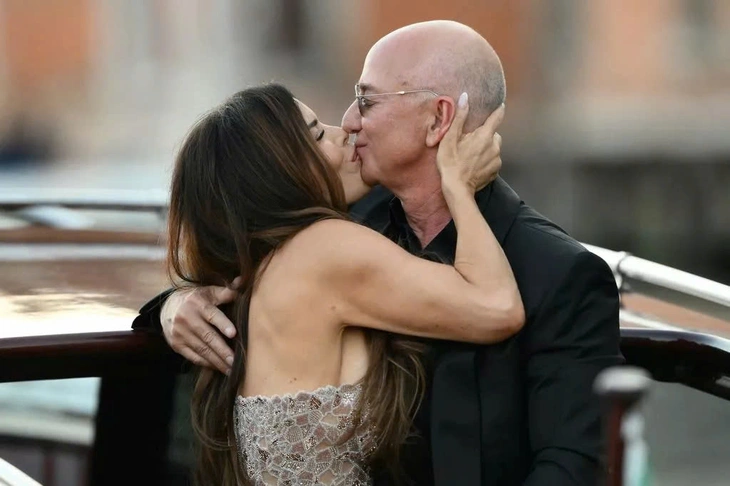As the clock struck midnight on June 29, 2025, the picturesque canals of Venice bore witness to the grand finale of one of the most lavish weddings in recent memory. Jeff Bezos, the Amazon titan and the world’s fourth-richest man, and his bride, Lauren Sánchez, capped their three-day nuptial extravaganza with a pyjama-themed sleepover party, undeterred by the mounting protests that had shadowed the event. Held at the secluded Arsenale, a historic shipyard turned venue, the celebration drew a constellation of A-list celebrities, while outside, Venetians voiced their fury over the billionaire’s perceived exploitation of their city. This clash of opulence and resistance has left the world both mesmerized and divided, raising questions about wealth, privilege, and the soul of a city steeped in history.
The Grand Finale: A Sleepover for the Elite
The final night of Bezos and Sánchez’s wedding was nothing short of theatrical. Sources close to the event described a “full-on dance party” where guests, including Oprah Winfrey, Leonardo DiCaprio, and the Kardashian-Jenner clan, traded their formal attire for silk pyjamas. Performances by Usher and DJ Cassidy set the tone, following a ceremony graced by Andrea Bocelli’s son, Matteo, the previous night. The couple, who exchanged vows on June 27 on the island of San Giorgio Maggiore, transformed the Arsenale into a playground of luxury, with reports suggesting a $50 million price tag for the entire affair. The sleepover theme, complete with plush bedding and gourmet midnight snacks, was a nod to Sánchez’s vision of a “princess-like” celebration, inspired by her Dolce & Gabbana gown reminiscent of Sophia Loren’s iconic 1950s look.
Yet, this extravagance came with a backdrop of logistical marvels—and controversies. Over 90 private jets descended on Marco Polo Airport, while superyachts, including Bezos’ $500 million Koru, dotted the lagoon. Five hotels were reportedly booked out, and former US Marines provided security, highlighting the event’s scale. For some, it was a testament to love and wealth; for others, a stark symbol of inequality.
The Protest Movement: Voices of Resistance
The wedding’s opulence was met with fierce opposition from Venice’s residents and activists. Groups like “No Space for Bezos” had been vocal for weeks, arguing that the event turned their sinking, over-touristed city into a billionaire’s playground. Protests escalated as the weekend unfolded, with hundreds marching on June 28, chanting “Bezos, f**k off” and “Out of our lagoon!” Banners reading “Kisses Yes, Bezos No” and satirical floats featuring a Jeff Bezos mannequin clutching an Amazon box underscored the sentiment. Activists claimed a victory when the main reception was moved from the central Scuola Grande della Misericordia to the more isolated Arsenale, citing security concerns and their canal-blockade threats.
The grievances ran deep. Locals pointed to Venice’s struggles with overtourism, rising housing costs, and climate-induced flooding, exacerbated by the influx of private jets and yachts. One protester, Sofia D’Amato, emphasized that the issue wasn’t envy of Bezos’ wealth but the “slap in the face” it represented to residents barely able to pay rent. Another Amazon worker at the demonstration lamented the disparity between the event’s millions and their meager wages. Greenpeace and other groups joined the fray, unfurling banners in St. Mark’s Square and criticizing Bezos’ lifestyle as environmentally reckless, especially amid global climate concerns.
The City’s Divided Response
Venice’s reaction was far from unanimous. While activists decried the wedding, some residents and officials saw it as an economic boon. Mayor Luigi Brugnaro hailed it as an “honor,” noting that Bezos and Sánchez donated €1 million each to three cultural institutions, totaling €3 million. The city’s tourism ministry estimated a potential 68% boost to annual turnover, a lifeline for a city grappling with post-pandemic recovery. Business owners, like those at Rosa Salva bakery, welcomed the influx, having prepared sweets for the occasion months in advance.
However, this narrative of economic benefit is contested. Critics argue the donations were a belated attempt to appease anger, with one activist calling them “paltry” for a magnate of Bezos’ stature. The day-tripper tax of €5-10, meant to curb overtourism, was dismissed as ineffective, reinforcing Venice’s image as a theme park for the rich. The contrast between the couple’s $55 million spend and the eviction of residents like 77-year-old Roberto—who still found the event “positive”—highlighted a city torn between survival and identity.
A Wedding Marred by Weather and Politics
The festivities weren’t without hiccups. A thunderstorm disrupted the welcome party on June 26, forcing celebrities like Kendall and Kylie Jenner to seek cover in water taxis. Bezos himself acknowledged the city’s unpredictability, quipping to reporters, “It can’t exist and yet here it is.” The event also carried political undertones, with protesters linking Bezos to Donald Trump, citing his presence at the president’s inauguration and Amazon’s labor practices. This politicization added a layer of tension, with some seeing the wedding as a celebration of a global elite accused of anti-union animus and tax evasion.
Security measures were stringent, with bomb-sniffing dogs and a relocated venue reflecting the protest threat. Inflatable crocodiles, once planned to clog canals, were abandoned, but the sentiment persisted. A Bezos look-alike, Cagdas Halicilar, even joined the fray, posing for selfies and adding a surreal twist to the coverage. Meanwhile, the couple’s Instagram posts—Sánchez blowing kisses and Bezos waving—drew ire for their perceived tone-deafness amid the backlash.

The Global Spotlight and Cultural Critique
The wedding captivated global media, with outlets like The Guardian and CNN detailing every move, from Sánchez’s 27-dress wardrobe to the Amalfi Coast catering. Yet, it also sparked a cultural critique. Posts on X reflected a mix of awe and outrage, with some calling it “tacky” and others praising the protests as a stand against greed. The event’s timing, amid Europe’s heatwave and climate warnings, amplified accusations of billionaire arrogance, with slogans like “The planet is burning” gaining traction.
Venice’s history as a stage for opulence—once hosting emperors and now billionaires—adds irony. The city, sinking under tourism and sea levels, became a literal and metaphorical battleground. While officials defended the event’s prestige, the protests suggested a deeper rejection of a system where wealth can “rent a city,” as one activist put it. This tension mirrors broader debates about inequality, a theme Bezos’ wealth—estimated at $231 billion—inevitably invites.
Reflections on Love, Power, and Legacy
For Bezos and Sánchez, the wedding was a personal milestone, four years after their public romance began and two since their 2023 engagement with a 30-carat ring. Their choice of Venice, with its romantic allure, was deliberate, echoing past celebrity nuptials like George Clooney’s 2014 wedding. Yet, the extravagance—pyjama parties, foam parties on the Koru, and a guest list rivaling a UN summit—raised questions about legacy. Is this a celebration of love or a display of power?
The couple’s donations and Sánchez’s charitable work, including her space advocacy, offer a counterpoint, but the protests suggest many see these as insufficient. The sleepover party, with its whimsical excess, might be remembered less for romance and more for the resistance it provoked. As the newlyweds waved goodbye from their hotel, the image of a city divided lingered, a reminder that even billionaires can’t buy universal approval.
Conclusion
Jeff Bezos and Lauren Sánchez’s wedding concluded with a sleepover party that blended Hollywood glamour with Venetian charm, yet it was overshadowed by tense protests reflecting deeper societal rifts. The event’s $50 million price tag, star-studded guest list, and lavish details stood in stark contrast to the struggles of Venice’s residents, fueling a narrative of wealth versus community. While the city’s officials celebrated the economic lift, the activists’ “enormous victory” in forcing a venue change hinted at a shifting tide. As of June 30, 2025, the wedding’s legacy remains contested— a fairy tale for some, a cautionary tale for others—leaving Venice and the world to ponder the cost of such grandeur.





